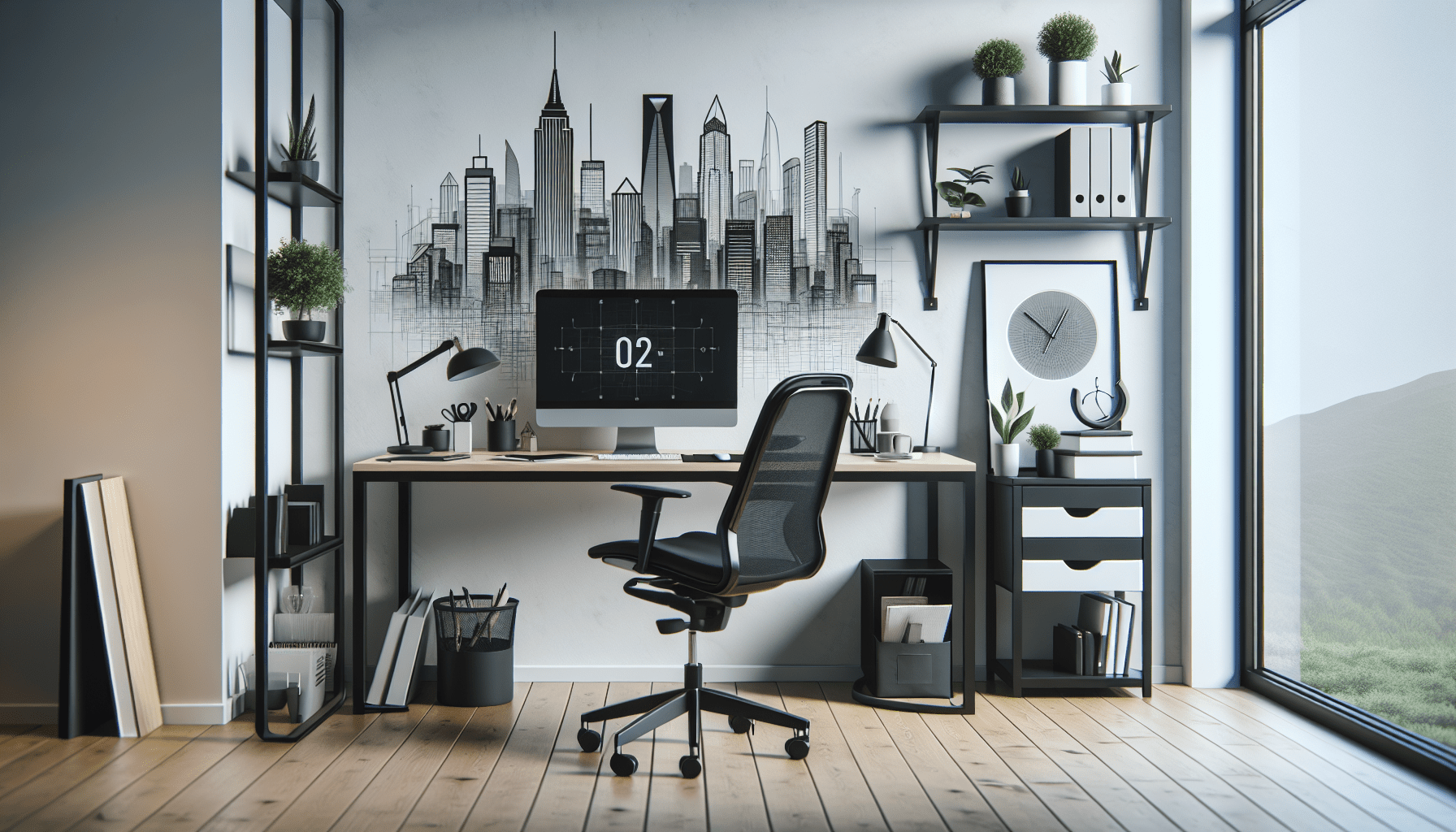What Are The 3 General Rules For Qualifying Your Home Office As A Business Expense?
You’ve been working from home for some time now and wondering if you can claim your home office as a business expense. As you navigate through the complexities of tax season, it’s important to understand the three general rules that determine whether your home office qualifies as a business expense. By familiarizing yourself with these rules, you can ensure that you’re taking advantage of all the deductions you’re entitled to. So, let’s dive in and explore these rules together!
General Rule #1: Exclusive and Regular Use
Definition of Exclusive Use
When it comes to qualifying your home office as a business expense, the first general rule you need to consider is exclusive use. This means that a specific area of your home is used only for business purposes and is not used for any personal activities. To satisfy this requirement, you must have a designated space in your home that is solely dedicated to your business activities.
Definition of Regular Use
In addition to exclusive use, the second requirement for qualifying your home office as a business expense is regular use. This means that you regularly and consistently use your home office for conducting your business activities. Occasional or sporadic use may not meet the regular use requirement.
Exceptions to the Exclusive Use Rule
While exclusive use is generally required to claim a home office deduction, there are certain exceptions to this rule. If you use a specific area of your home for both business and personal activities, you may still be eligible for the deduction if you meet one of the following exceptions:
-
Storage of inventory or product samples: If you use part of your home solely for storage of inventory or product samples, even if you use that area for personal activities, you may qualify for the home office deduction.
-
Daycare facility: If you run a daycare facility out of your home, you may be able to claim a home office deduction even if you use that space for personal activities.
-
Separate structures: If you have a separate structure on your property, such as a detached garage or a studio, that is used exclusively and regularly for business purposes, you may qualify for the home office deduction even if you use your main home for personal activities.
It’s important to note that while these exceptions allow for mixed-use areas, the portion of your home used exclusively for business activities must still meet the exclusive and regular use requirements.
General Rule #2: Principal Place of Business
Definition of Principal Place of Business
The second general rule for qualifying your home office as a business expense involves determining your principal place of business. Your principal place of business is the primary location where you conduct the most significant activities of your trade or business. It doesn’t necessarily have to be the place where most of your time is spent, but rather where the substantial administrative or management functions of your business occur.
Factors to Determine Principal Place of Business
To determine your principal place of business, consider the following factors:
-
Administrative or management activities: If you primarily conduct administrative or management activities from your home office, such as bookkeeping, billing, or customer communication, then your home office may be considered your principal place of business.
-
Importance of activities performed: Analyze the significance of the activities performed at each location. If the majority of your business activities and decisions are made at your home office, then it may be considered your principal place of business.
-
Non-home office work sites: If you have multiple work locations, evaluate the extent of activities performed at each location. If your home office is used for substantial administrative or management activities and the other locations are secondary in importance, your home office may still be considered your principal place of business.
Exceptions to the Principal Place of Business Rule
While the principal place of business is typically determined by the location of your most significant business activities, there are exceptions to this rule. If you have no other fixed location where you regularly conduct substantial business activities, your home office can be considered your principal place of business, even if you engage in administrative or management activities outside of your home.
It’s essential to thoroughly evaluate your specific business activities and consult with a tax professional to determine your principal place of business and ensure compliance with IRS regulations.

General Rule #3: Administrative or Management Activities
Definition of Administrative or Management Activities
The third general rule for qualifying your home office as a business expense revolves around administrative or management activities. The IRS allows you to deduct expenses related to your home office if it is used for administrative or management activities associated with your business.
Examples of Qualifying Activities
Qualifying administrative or management activities include:
-
Bookkeeping and recordkeeping: If you use your home office to maintain your business records, track your income and expenses, and prepare financial statements, you may qualify for the home office deduction.
-
Billing and invoicing: Using your home office to generate invoices, bill clients, and manage your accounts receivable can be considered a qualifying administrative or management activity.
-
Scheduling and client communication: If you use your home office to schedule appointments, communicate with clients, and plan your business activities, these activities can qualify for the home office deduction.
Determining Percentage of Business Use
To calculate the percentage of your home used for business purposes, you generally need to divide the square footage of your home office by the total square footage of your home. However, if the square footage method is impractical or inaccurate, you can determine the business portion of your home by using a reasonable alternative method, such as the number of rooms or time spent using the space for business purposes.
It’s important to note that the space used for administrative or management activities should be regularly and exclusively dedicated to your business. This means that if you use your home office for personal activities outside of your scheduled business hours, you cannot include that time as business use.
Additional Considerations for Home Office Deductions
Self-Employed Individuals
For self-employed individuals, qualifying for a home office deduction can provide significant tax savings. In addition to meeting the general rules discussed earlier, self-employed individuals should also consider the following:
-
Simplified option: The IRS offers a simplified option for calculating the home office deduction, allowing you to deduct $5 per square foot of your home used for business purposes, up to a maximum of 300 square feet.
-
Other business expenses: Along with the home office deduction, self-employed individuals can deduct other business-related expenses, such as office supplies, advertising costs, and professional services.
Employees Working from Home
If you are an employee who works from home, the rules for claiming a home office deduction are slightly different. To be eligible, you must meet the following additional criteria:
-
Convenience of the employer: Your home office must be for the convenience of your employer and not for your personal convenience. This means your employer must require or strongly encourage you to work from home.
-
Other work location: If you have another fixed location where you regularly perform substantial duties of your employment, you cannot claim a home office deduction, even if you meet all other requirements.
Meeting the Exclusive Use Requirement
Meeting the exclusive use requirement can be challenging for some individuals, especially if their home is limited in space. However, it’s important to note that the exclusive use rule does not necessitate an entire room solely dedicated to your business. A portion of a room can qualify as long as it is used exclusively for business purposes.
To meet the exclusive use requirement, consider using dividers or partitions to separate your work area from the rest of the room. Designing your space in a way that clearly distinguishes it as your office can help establish the exclusivity needed for the home office deduction.
Calculating Deductions for Multiple Uses
Those who use their home office for both business and personal purposes may wonder how to calculate deductions in such situations. The IRS allows you to deduct the expenses associated with the portion of your home used exclusively for business. This means you can deduct the expenses related to the square footage or portion of a room used for business purposes.
To accurately calculate deductions for multiple uses, divide the total expenses of operating your home (such as rent, mortgage interest, property tax, utilities, and insurance) between personal and business use based on the percentage of your home used exclusively for business.
Recordkeeping and Documentation
Maintaining proper records and documentation is vital when claiming a home office deduction. Keep detailed records of your expenses related to the home office, such as rent or mortgage payments, utilities, repairs, and maintenance. It’s also crucial to keep supporting documentation, including invoices, receipts, and bank statements.
Additionally, document the business activities performed in your home office, including meeting notes, client communications, and work logs. These records will help substantiate your claim and provide evidence in case of an audit.

IRS Home Office Deduction Form
Form 8829
To claim a home office deduction, you must complete IRS Form 8829, Expenses for Business Use of Your Home. This form is used to calculate the allowable home office deduction and determine the amount to be reported on your tax return.
Required Information
When completing Form 8829, you’ll need to provide the following information:
-
Total square footage: The total square footage of your home.
-
Square footage of home office: The square footage of the area in your home exclusively used for business.
-
Expenses: Itemize and calculate the expenses associated with operating your home, such as mortgage interest, property taxes, utilities, and homeowners’ insurance.
Completing the Form
Form 8829 consists of multiple sections that allow you to calculate the deductible portion of your home expenses accurately. Each section requires specific information, and it’s crucial to review the instructions provided by the IRS or consult a tax professional to ensure accurate completion.
Special Rules and Limitations
While Form 8829 is relatively straightforward, there are special rules and limitations to be aware of. For example, the total deduction for certain expenses, such as mortgage interest and real estate taxes, may be subject to limitations based on your income.
Additionally, if your gross income from your business is less than your total business expenses, the deduction for certain business-related expenses, including the home office deduction, may be limited. Understanding these rules and limitations is essential when completing Form 8829.
Reporting and Filing
Once you have completed Form 8829, you will transfer the calculated home office deduction amount to the appropriate section of your tax return. Typically, this is reported on Schedule C (Form 1040) for sole proprietors or Schedule F (Form 1040) for farmers. Remember to keep a copy of your completed form and supporting documentation for your records.
Common Mistakes to Avoid
Mixing Personal and Business Use
One common mistake when claiming a home office deduction is mixing personal and business use. It’s important to separate the two activities and ensure that the area used for business purposes is exclusively dedicated to your business.
Avoid using your home office for personal activities outside of your scheduled business hours, as this may jeopardize your eligibility for the home office deduction.
Inaccurate Square Footage Calculation
Another common mistake when claiming a home office deduction is inaccurately calculating the square footage of your home office. Ensure that you accurately measure and calculate the area used exclusively for business activities. Remember to consider the entire space within the walls, including closets or storage areas used for business purposes.
Inadequate Recordkeeping
Proper recordkeeping is essential when claiming a home office deduction. Maintain detailed records of your home-related expenses, supporting documentation, and records of your business activities performed in your home office. Adequate recordkeeping helps substantiate your claim and makes it easier to respond to any IRS inquiries or audits.
Failure to Meet Exclusive Use Requirement
Failing to meet the exclusive use requirement is a common pitfall for many taxpayers. Remember that any personal use of the space designated as a home office can disqualify you from claiming the deduction. Be diligent in using the designated area exclusively for business activities and avoid using it for personal purposes.
Consequences of Improper Deductions
Underpayment of Taxes
Improperly claiming a home office deduction can result in underpayment of taxes. If the IRS determines that you are not eligible for the deduction due to noncompliance with the rules, you may be required to repay the tax savings you wrongly claimed. This can result in unexpected tax liabilities and potential financial strain.
Penalties and Interest
Incorrectly claiming a home office deduction may also lead to penalties and interest charges. The IRS may impose penalties for substantial underpayment of taxes, negligence, or substantial valuation misstatements. Interest charges can accrue on any unpaid taxes resulting from an improper deduction, adding to your overall financial burden.
IRS Audits and Reviews
Claiming a home office deduction increases your chances of being audited or reviewed by the IRS. The IRS pays close attention to home office deductions due to the potential for abuse and misinterpretation of the rules. If you are selected for an audit or review, you will be required to provide documentation and evidence to support your deduction. Failure to do so may result in disallowance of the deduction and additional penalties.
Consulting a Tax Professional
Benefits of Professional Advice
Given the complexities and potential pitfalls associated with claiming a home office deduction, consulting a tax professional can provide numerous benefits. A tax professional can help you understand the intricacies of the rules, determine your eligibility, and accurately calculate your deductions. They can also provide guidance on proper recordkeeping and documentation to ensure compliance with IRS requirements.
Navigating Complex Tax Laws
Tax laws are often complex and subject to interpretation. A tax professional can navigate these laws, helping you avoid common mistakes and pitfalls. They stay up to date with the latest IRS regulations and can provide expert advice tailored to your specific circumstances.
Maximizing Deductions
A tax professional can help you maximize your home office deduction by ensuring you claim all eligible expenses and correctly calculate the deductible portion. They can provide insights into lesser-known deductions and strategies to increase your tax savings while remaining in compliance with IRS guidelines.
Minimizing Audit Risks
By working with a tax professional, you can minimize the risk of an IRS audit or review. A tax professional ensures your deductions are accurate, well-documented, and in compliance with IRS regulations. They can also guide you through the audit process should you ever be selected for one.
Conclusion
Qualifying your home office as a business expense is governed by three general rules: exclusive and regular use, principal place of business, and administrative or management activities. By understanding these rules and the exceptions that may apply, you can maximize your chances of claiming a home office deduction while avoiding the consequences of improper deductions.
Remember to keep thorough records, accurately calculate your deductions, and consider consulting a tax professional. By doing so, you can navigate the complexities of the tax laws, maximize your deductions, and minimize the risks associated with claiming a home office deduction.



